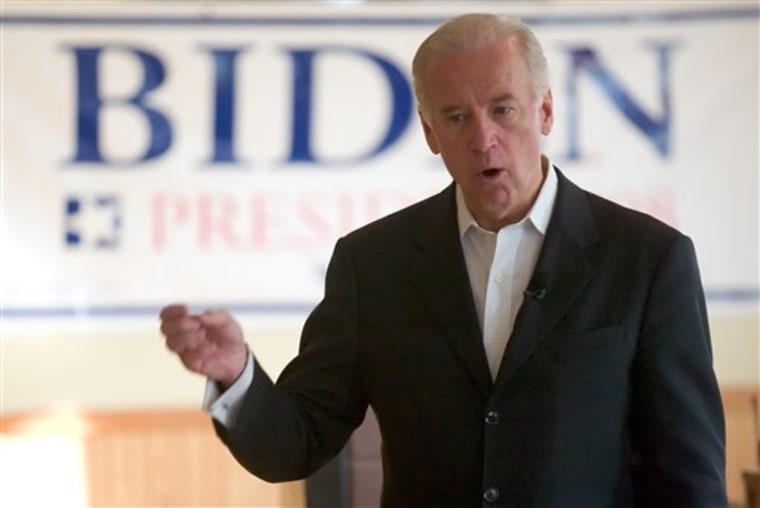Positions on the country's direction at home and abroad are starting to take shape in the blur of motion, money and ambition of the 2008 presidential contest.
Candidates vying for the Democratic and Republican presidential nominations all have records in office of some sort, so there are no blank slates. Most have a select few issues upon which to ground their early campaign - a health care plan here, an outline on immigration, diplomacy or the environment there.
Many more pieces are to come for those who are in for the long haul.
Iraq is defining the campaign less than a year away from the primaries that will choose the presidential candidates for the November 2008 election.
The GOP front-runners support continued prosecution of the war. Democrats oppose the troop buildup, differing among themselves mainly on the speed with which they would start a withdrawal.
"Iraq is sort of that boulder in the road that you have to move before you can get to the rest of the issues," one Democratic hopeful, Sen. Joe Biden of Delaware, said in a South Carolina campaign stop.
Candidate by candidate
Behind the big rock of Iraq, only a few signature issues, varying by candidate, have come out in more than sketchy form.
Among Democrats, John Edwards has laid out a detailed plan to achieve universal health insurance, a blank slate so far for his chief rivals, and has proposed an anti-poverty program as well. Edwards is alone in acknowledging his plans would require higher taxes.
Republicans are feeling their way on the social issues important to the GOP base, with none of the top-tier candidates a perfect fit for social conservatives.
Giuliani's long-standing support for abortion rights and gay rights stands in marked contrast to the positions now taken by former Massachusetts Gov. Mitt Romney, who has swung to the right on both issues.
Sen. John McCain, R-Ariz., has a long record of opposing abortion rights, but also a record of doing so without much enthusiasm. He and Giuliani stand together in opposing a constitutional amendment to ban gay marriage, favored by Romney.
On global warming, McCain has more in common with Illinois Democrat Barack Obama - namely, a bill in the Senate with both their names on it - than with fellow Republicans seeking the nomination.
While most GOP candidates favor market innovation or federal enticements to clean the air, McCain is a leading sponsor of legislation that would mandate reductions in greenhouse gas emissions.
International issues
Immigration also splits the GOP field.
McCain, Giuliani, Kansas Sen. Sam Brownback and former Arkansas Gov. Mike Huckabee support a conditional path to legal status for illegal immigrants in the country. Reps. Tom Tancredo of Colorado and Duncan Hunter of California do not. Romney is unclear.
Most candidates from both parties support construction of a fence along part of the Mexican border, but not border-state Gov. Bill Richardson of New Mexico. He says the fence will not work and will only hurt relations with the southern neighbor.
Iran is an emerging issue. All Democratic candidates favor negotiating directly with Iran; most of the Republicans are against that, or at least wary.
Hostile rhetoric, however, is coming from both parties.
Obama explicitly leaves open the possibility of pre-emptive military action against Iran if diplomacy fails to stop Iranian officials from developing nuclear weapons. Sen. Chris Dodd, D-Conn., says direct talks should not be held with Iranian President Mahmoud Ahmadinejad, a "thug."
Biden called Ahmadinejad a "madman" courting assassination by Shia extremists.
Among Republicans, McCain proposes bolstering U.S. forces near Iran to discourage intervention in Iraq. Brownback wants to help dissidents destabilize the Iranian leadership by spending $100 million a year for "democracy building, civil society building, and civil disobedience building."
At this point, positions can sometimes be divined only by knowing what candidates oppose.
Romney's criticisms of McCain for being soft on illegal immigrants suggest he is against Senate-passed legislation that sought to toughen border enforcement while offering conditional legalization. But Romney has not laid out his solution. The Senate's proposed changes failed in the House.
Social issues
The Democrats are united in supporting abortion rights, embryonic stem cell research and a schedule of some sort for getting out of Iraq, whether it is the immediate start of a withdrawal favored by Edwards and Ohio Rep. Dennis Kucinich or more measured ones advocated by Biden, Clinton, Obama and others.
Still, so much is missing from their platforms that there is not much policy to fight over.
While the candidates are never at a loss for words when asked about education, Social Security, farm policy and trade, for example, most are at a loss for a plan.
Democrats are loath to confer federal recognition on same-sex marriage, yet all oppose a constitutional amendment to ban it. That leaves a lot of middle ground - and an awkward silence. Among the social issues, gay marriage is proving to be the toughest one for Democrats to deal with.
Clinton, for one, once opposed same-sex marriage and has told gay-rights groups she has learned some things since she took that position. Spokesman Phil Singer said Sunday the senator is, in fact, opposed to gay marriage, but would let states decide whether to sanction it.
Edwards has been similarly torn, and admits it. "I don't know the answer," he said.
